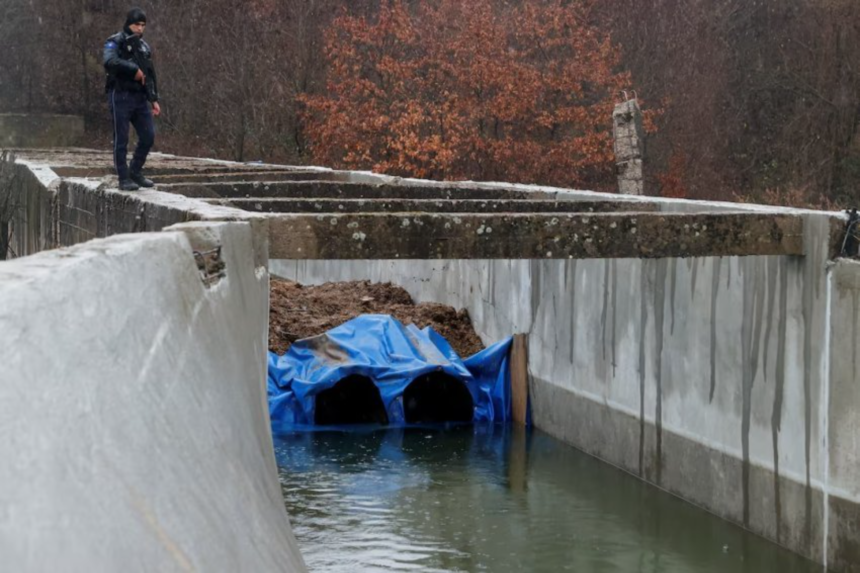The recent explosion on November 29 at the Ibër-Lepenc canal in northern Kosovo has sparked widespread speculation and rising tensions, with calls for an independent investigation to determine responsibility. Legal and security experts stress the importance of accurately identifying those responsible, suggesting that international involvement, particularly from the European Union (EU) and the United States, would enhance the credibility of the investigations and help reduce regional tensions.
The explosion, caused by around 20 kilograms of explosives, severely damaged the critical infrastructure of the canal, which supplies water to several cities and thermal power plants in Kosovo. The attack, deemed the most serious on Kosovo’s infrastructure since the 1998/99 war, led to significant material damage and disruptions in water and electricity supply.
Kosovo Prime Minister Albin Kurti swiftly blamed Serbia for what he called a “terrorist attack,” accusing the country of copying Russia’s methods in its war with Ukraine. He further linked the attack to Russian military symbols found during subsequent police raids, suggesting that Russia’s involvement or influence was present.
Serbia’s President Aleksandar Vučić denied any Serbian involvement, condemning the attack but stating that investigations would reveal the perpetrators. “We have certain suspicions, but the investigations will show who ordered the attack,” Vučić stated.
Following the attack, Kosovo authorities conducted several raids in the north, confiscating arms, ammunition, and military equipment. Ten individuals were detained for their suspected involvement, with two placed in custody for a month.
U.S. Ambassador to Pristina, Jeffrey Hovenier, stated on December 2 that it is too early to determine the perpetrators, stressing that all groups and nations remain under suspicion. “The United States supports a comprehensive investigation. We have offered full support to Kosovo authorities in this investigation,” Hovenier said, highlighting the importance of holding those responsible accountable.
The European Union also condemned the attack, offering assistance in the ongoing investigation. Kosovo’s government confirmed that the investigation is being carried out by local authorities, though they are in constant communication with international partners who could assist in the process.
Kosovo’s President Vjosa Osmani, during a visit to Brussels this week, urged international cooperation in the investigation, presenting evidence of Serbia’s alleged ties to the attack, although she did not specify the details.
In a debate at the European Parliament’s Foreign Affairs Committee, several MEPs expressed solidarity with Kosovo but called for more evidence to prove Serbia’s involvement. Austrian MEP Thomas Waitz emphasized the need for an international investigation.
Mark Ellis, Executive Director of the International Bar Association, supported the idea of an independent investigation to prevent the situation from escalating. “This is a situation where international authorities want tensions to remain minimal and want an objective assessment of what happened,” Ellis stated, pointing out the importance of impartial international involvement, such as that of the U.S., EULEX, or NATO’s KFOR mission.
Ellis emphasized that the duration of the investigation should not be limited but rather based on the time required to gather sufficient evidence. “Focused efforts with the resources and expertise of the U.S. and the EU are necessary,” Ellis added.
Jamie Shea, former NATO official, agreed that external assistance would be valuable, and that cooperation from Serbia would be welcomed. “Every help from Vučić in Belgrade would be beneficial. He denies Serbia’s involvement, and for now, we must trust his words, but any help from him would be helpful,” Shea said.
Shea also pointed out that such attacks could disrupt the dialogue between Kosovo and Serbia, especially as the EU prepares for the next round of talks. He warned that these incidents often occur when progress on dialogue is being made.
Three days after the attack on Ibër-Lepenc, both Kurti and Vučić were in Brussels for separate meetings with EU foreign affairs chief, Kaja Kallas. While the EU stated that these talks were not part of the normalisation dialogue, Shea cautioned that Kosovo must be careful not to alienate the new European leadership by refusing to meet with the Serbian side.
Kurti and Vučić last met in September 2023, discussing the implementation of the Ohrid Agreement on normalising relations. Shortly after that meeting, the attack on Banjskë occurred, in which armed Serbian groups killed a Kosovo police officer. Kurti had conditioned his participation in a meeting with Vučić on the surrender of Serbian national Milan Radoičić, who took responsibility for organising the Banjskë attack.
Nearly a year later, Kosovo’s Special Prosecutor’s Office filed charges against 45 Serb nationals, including Radoičić. Prosecutor Naim Abazi stated that international cooperation with the U.S., the EU, and others helped secure the evidence for the strong indictment.
Ellis cited examples of international investigations in Ukraine and the Middle East, where impartial assessments helped provide objective evaluations of events. “These investigations ensure that these events are not used for political maneuvering by opposing sides in the conflict,” he explained.
As repairs continue on the Ibër-Lepenc canal, local residents live in fear of future attacks. Although Radio Free Europe’s efforts to speak with locals were unsuccessful, residents expressed concerns for their safety. Amid the uncertainty, many see the messages from authorities as empty promises.







